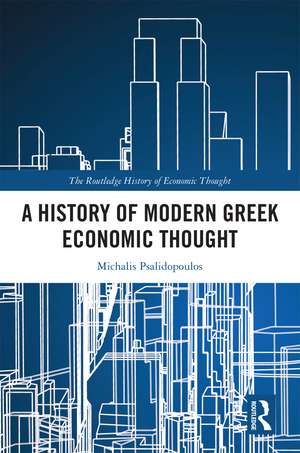A History of Modern Greek Economic Thought: The Routledge History of Economic Thought
Autor Michalis Psalidopoulosen Limba Engleză Hardback – 16 apr 2024
The book explores how native, religious-oriented economic thought was secularized and merged with different economic discourses during successive historical periods. It traces how the dissemination of French and German economic thought in the 19th century was followed by British and US influences in the 20th century. The institutionalization of economics as a discipline in the 1920s and its internationalization after 1971, with their effects on the emergence of modern mainstream and heterodox thought, are also discussed. Finally, reference is made to contemporary Greek economic thought in the frame of European Union economic thinking.
This book will be of interest to readers in the history of economic thought, economic history, intellectual history, Greek history, and modern European history more broadly.
Preț: 1000.27 lei
Preț vechi: 1219.84 lei
-18% Nou
Puncte Express: 1500
Preț estimativ în valută:
191.42€ • 207.86$ • 160.80£
191.42€ • 207.86$ • 160.80£
Carte tipărită la comandă
Livrare economică 23 aprilie-07 mai
Preluare comenzi: 021 569.72.76
Specificații
ISBN-13: 9781138220256
ISBN-10: 1138220256
Pagini: 280
Dimensiuni: 156 x 234 x 18 mm
Greutate: 0.45 kg
Ediția:1
Editura: Taylor & Francis
Colecția Routledge
Seria The Routledge History of Economic Thought
Locul publicării:Oxford, United Kingdom
ISBN-10: 1138220256
Pagini: 280
Dimensiuni: 156 x 234 x 18 mm
Greutate: 0.45 kg
Ediția:1
Editura: Taylor & Francis
Colecția Routledge
Seria The Routledge History of Economic Thought
Locul publicării:Oxford, United Kingdom
Public țintă
Postgraduate and UndergraduateRecenzii
Michalis Psalidopoulos' integration of two centuries Greek economic history with the history of economic thought is done in a paradigmatic way. The book lays stress on the dissemination of ideas of major economists and schools of economic thought, and the way these ideas were perceived and implemented in Greece either to stimulate economic growth or to deal with the harsh reality of economic slowdowns. The book extends the analysis and applied policies to the great recession of 2007 that affected Greece more than any other country.
Lefteris Tsoulfidis, Professor in the Department of Economics, University of Macedonia
Lefteris Tsoulfidis, Professor in the Department of Economics, University of Macedonia
Cuprins
Introduction
1 Before 1821
2 French Ideas and German Cameralism (1821–62)
3 The Age of French Economic Liberalism (1862–97)
4 The Age of the German Historical School (1897–1944)
5 Economics Takes Off: The Institutionalization of Economics (1920–71)
6 The (Subtle) Anglo-Saxonization of Greek Economics (1944–71)
7 The Internationalization of Greek Economics after 1971
Concluding Summary
1 Before 1821
2 French Ideas and German Cameralism (1821–62)
3 The Age of French Economic Liberalism (1862–97)
4 The Age of the German Historical School (1897–1944)
5 Economics Takes Off: The Institutionalization of Economics (1920–71)
6 The (Subtle) Anglo-Saxonization of Greek Economics (1944–71)
7 The Internationalization of Greek Economics after 1971
Concluding Summary
Notă biografică
Michalis Psalidopoulos is Chief Consultant at the Institute for Hellenic Growth and Prosperity of the American College of Greece and Professor Emeritus for the History of Economics at the National and Kapodistrian University of Athens, Greece.
Descriere
Tracing the evolution of economic ideas in the context of the economic history and economic policy issues in Greece, this book examines the history of modern Greek economic thought from the War of Independence from Ottoman rule in 1821 until the present.
















